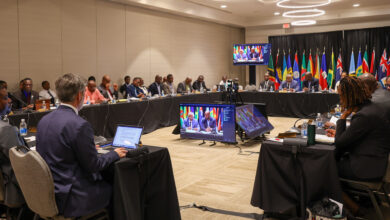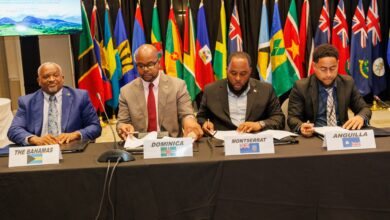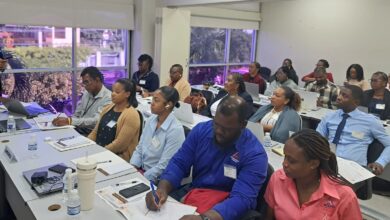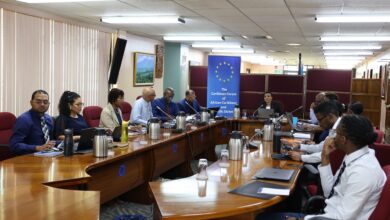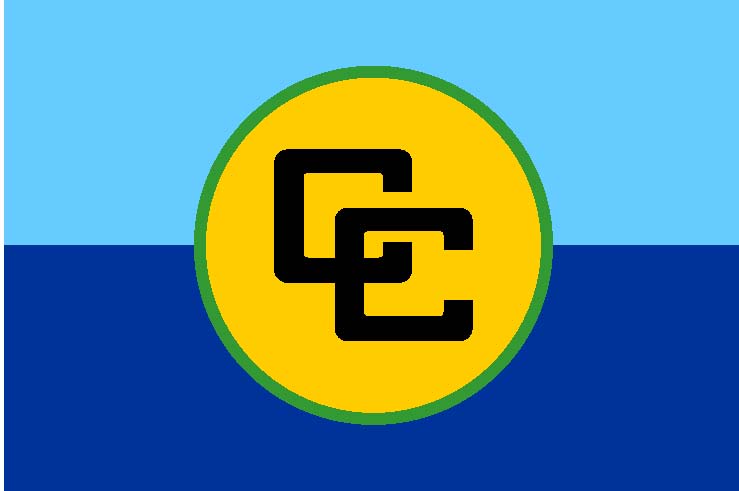Mr. Chairman
Honourable Prime Minister of St. Kitts and Nevis
Madam Chancellor of the Judiciary
Honourable Ministers
Sir George Alleyne and Lady Alleyne
Members of the Diplomatic Corps
Deputy Secretary-General
Representatives of Regional and International Organisations
Other Distinguished Guests
Assistant Secretary-General and other Members of Secretariat Staff
Members of the Media
Ladies and Gentlemen
When the proposal for a special tribute to Sir George “Champ” Alleyne was put to me, there was no hesitation at all on my part. It superseded any other commitments that I may have had. How else could it be? An evening dedicated to an outstanding Caribbean man, friend, and colleague, and his charming wife, and to bestow on him a most fitting accolade, in the company of many who have shared in his life's work and benefitted therefrom, that to me was to me a most gratifying way to spend an evening.
Although the Caribbean Community has already recognized Sir George's outstanding contribution by conferring on him , its highest honour, the Order of the Community (OCC), Sir George's life's work has been linked so intricately to the Council for Human and Social Development (COHSOD), and has exerted such an inestimable influence on its strategic priorities and functioning, that I could not but endorse the idea that the bestowal of a special honour on Sir George Alleyne, by COHSOD, was most appropriate.
COHSOD is a very important Organ of the Community as it focuses on the issues that directly affect the lives of the people of this region. Its concerns – with education, health and labour; with youth, sport, crime and illicit drugs; with gender and culture – are all components of the human dimension of development. Without this focus on the human element – in a phrase “on the quality of life issues” development would not be much more than a pecuniary pursuit, and even our quest to achieve a Caribbean Single Market and Economy, would have little social purpose.
It is no wonder then that the COHSOD theme, “Investing in Human Resources with Equity” is indeed at the heart of Sir George's own refrain that “health is central to development”.
In this programme, this afternoon, Tributes will be given by the Chairman of COHSOD, Dr. Douglas Slater, Minister of Health St. Vincent and the Grenadines; Dr Peter Piot, Executive Director of UNAIDS and by The Hon, Dr. Denzil Douglas, Prime Minister of St. Kitts and Nevis and Prime Minister with regional responsibility for Health and Development in the Quasi Cabinet of the Heads of Government. He will also receive through Dr. Leslie Ramsammy, Minister of Health of Guyana, a special commendation, on behalf of His Excellency the President Bharrat Jagdeo. In addition, tributes from a cross section of leaders of regional and international institutions and from his colleagues and friends have been received and have been compiled in a special document. They fully attest to the widespread respect and admiration for a man who, through his outstanding work, has stamped his legacy not only on this Region, nor indeed only on the Americas for which PAHO has responsibility but even on the entire world stage.
My task today is essentially to chair this special session. You will permit me, however if I were to use the Chairman's prerogative to make a few remarks regarding Sir George's contribution. First of all I am proud to be an alumnus of the same institution as Sir George namely the University of the West Indies. When I entered UWI at Mona, Jamaica, Sir George had just about completed his medical degree and his accomplishments were already a part of university lore. The entire University Community, from Professors to first year students, was almost reverential of his singular feats.
This young man from a virtually unknown village in Barbados had won the island scholarship, a passport for him to study at almost any University in the World. Yet he chose UWI. In addition the same young man who graduated in the classics decided to do medicine and then to arrogantly arrogate unto himself the distinction of winning every conceivable prize throughout his illustrious studentship and thereby etched indelibly into the records of UWI, a specially high place on its honour role.
As a lesser mortal, I was therefore exhilarated in 1988 when at its 40th Anniversary celebrations, UWI decided that it would honour what it considered to be four (4) of its outstanding graduates, and in that process, somehow chose to confer on me, an honorary doctorate for my contribution in the field of Economics and Public Policy. You would understand the pleasure that I felt, when I tell you that at that ceremony, I had the good fortune to share the same platform with three others among whom was Sir George, who, as evidently expected, received his honorary doctorate for contributions in the field of medicine. I have remained eternally grateful to Sir George for having so enhanced my claim to fame. By the way, one of the other honourees was that outstanding Guyanese, now Professor at Stanford University, Dr. Ewart Thomas.
The professional trails blazed by Sir George, in regard to the importance of health in development, continue to provide for others who have responsibility for managing regional organizations, examples of how commitment to principles as a guide to action is an unassailable attribute. But principles, philosophies, even ideologies are not fixations removed from the environment and the changing times. Indeed their efficacy becomes sustainable only if they are responsive to the historical, cultural and economic determinants that help to shape and reshape values over time.
In this regard, I learnt how distraught Sir George was when the CARICOM 1988 study on “The Future of the Caribbean beyond 2000” failed to incorporate the role of health in its strategies for regional development post 2000. This was later recognized by the authors to be an oversight, one which all agreed must never recur [let me hasten to add for the records that in that period I was serving the region as Secretary General not of CARICOM but of the African, Caribbean and Pacific States (ACP). As the reggae singer Shaggy would say: “it wasn't me!”]. But even prior to the Report on the Future, our Community placed very high priority on health. As I said on Wednesday morning, at the Opening of this Council Meeting, 'in the very early days of the integration process when I first joined CARIFTA, the Health Section, under Dr. Phillip Boyd, was the most vital and dynamic section of the Secretariat.' Indeed, together with programmes in education under the rubric of functional cooperation it was the health initiatives not trade and economic policies with which much of the substantial success of the early integration process can be identified.
And also as I pointed out at that same opening session, “the effects of structural adjustment on the health sector in the Caribbean were essentially, but not totally, negated as a result of advocacy and application of regional health policies.”
Sir George's philosophy can be seen in this, and many other important achievement in this domain. Indeed, it is significant – in reading through the various tributes and from our own records– how catalytic Sir George has been to moving the process of health reform forward and what an impact his thinking has had on the policies and practices and the gains in health in the Caribbean and the Americas. There is no better illustration than in the Nassau declaration: 'the Health of the Region is the Wealth of the Region”, adopted at the Conference of Heads of Government in The Bahamas last July. Consulted on the initiative during the meeting of PAHO's Executive Board, Sir George found the time, made the effort and provided the most penetrating comments and suggestions that were incorporated in the final version of that Declaration, which is a landmark for future action and could secure the health of the region and contribute significantly to our continuing economic growth, development and competitiveness in the global arena.
Sir George continues to challenge, not only the medics, but the economists and the well-established socio-economy models. To him the very nature of the concept of human development makes it difficult to devise absolute measures. He openly voiced his disquiet about complex indices such as the Human Development Index. In its original formulation, this index, in Sir George's view, incorporated an unsatisfactory measure of health. I have it on good report that his critique on the initial index led to a reformulation that has gained popularity and is often quoted to compare the development status of countries in the world.
Therefore as we in the Caribbean move toward the establishment of a Single Market and Single Economy, it is important to be guided by Sir George's insightful views on this and other related issues on health and development.
Further, as we move forward with the implementation of the Nassau Declaration we hope that Sir George continues to find time after his well-earned retirement from PAHO to contribute to this area of regional development to which he has already given so much – indeed so much of his very life.
In that regard, earlier today Sir George and I signed a Memorandum of Understanding for cooperation in health between PAHO and CARICOM. This is as symbolic as it is significant. It will institutionalize cooperation in several areas related to capacity building, research and training through technical assistance, resource mobilization and joint action. I am indeed very happy that this activity coincides with and is part of COHSOD's Tribute to Sir George, as it is part of his legacy to the Region and hemisphere. It provides concrete ways to deliver meaningful programmes that fulfill the inter-sectoral objectives of this Council to invest in human resources with equity.
I therefore join COHSOD VI – and I am sure that I speak for the entire Community– in enjoining Sir George to continue to be part of this process that would truly ensure the pivotal place of health in development.
Ladies and Gentlemen, I now invite you to stand and salute a Champion Caribbean man! Champ Alleyne.

